Related Research Articles

Samuel Crowther, was a Yoruba linguist, clergyman, and the first African Anglican bishop of West Africa. Born in Osogun, he and his family were captured by slave raiders when he was about twelve years old. This took place during the Yoruba civil wars, notably the Owu wars of 1821–1829, where his village Osogun was ransacked. Ajayi was later on resold to Portuguese slave dealers, where he was put on board to be transported to the New World through the Atlantic.
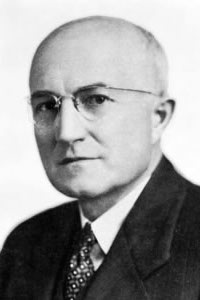
Kenneth Scott Latourette was an American historian and professor, specialized in Chinese studies, Japanese studies, and the history of Christianity. His formative experiences as a Christian missionary and educator in early 20th-century Imperial China shaped his life's work. Although he did not learn the Chinese language, he became known for his study of the history of China, the history of Japan, his magisterial scholarly surveys on world Christianity, and of American relations with East Asia.
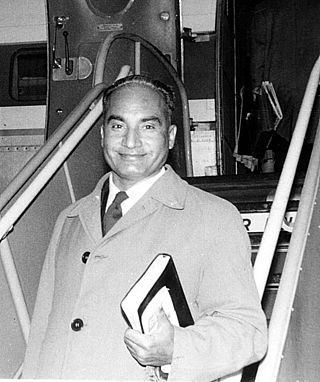
Bakht Singh Chabra also known as Brother Bakht Singh was a Christian evangelist in India and other parts of South Asia. He is often regarded as one of the most well-known Bible teachers and preachers and pioneers of the Indian Church movement and Gospel contextualization. According to Indian traditions, he is also known as 'Elijah of 21st Century' in Christendom. According to his autobiography, Bakht Singh became a Christian when he was an engineering student in Canada in 1929, even though previously he had torn up the Bible and was strongly opposed to Christianity. He was India's foremost evangelist, preacher and indigenous church planter who founded churches and established Hebron Ministries. He began a worldwide indigenous church-planting movement in India that grew to more than 10,000 local churches. Bakht Singh died on 17 September 2000, in Hyderabad, India.

Tiyo Soga was a Xhosa journalist, minister, translator, missionary evangelist, and composer of hymns. Soga was the first black South African to be ordained and worked to translate the Bible and John Bunyan's classic work Pilgrim's Progress into his native Xhosa language.
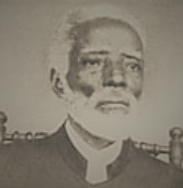
Carl Christian Reindorf was a Euro-African-born pioneer historian, teacher, farmer, trader, physician and pastor who worked with the Basel Mission on the Gold Coast. He wrote The History of the Gold Coast and Asante in the Ga language; scholars consider the book a “culturally important” work and an increasingly important source for Ghanaian history. The work was later translated into English and published in 1895 in Switzerland. He used written sources and oral tradition, interviewing more than 200 people in the course of assembling his history.

Christianity in Japan is among the nation's minority religions in terms of individuals who state an explicit affiliation or faith.

Christianity in Africa first arrived in Egypt in approximately 50 AD. By the end of the 2nd century it had reached the region around Carthage. In the 4th century, the Aksumite empire in modern-day Ethiopia and Eritrea became one of the first regions in the world to adopt Christianity as its official religion. The Nubian kingdoms of Nobatia, Makuria and Alodia followed two centuries later. From the late fifth and early sixth century, the region included several Christian Berber kingdoms. Important Africans who influenced the early development of Christianity and shaped the doctrines of Christianity include Tertullian, Perpetua, Felicity, Clement of Alexandria, Origen of Alexandria, Cyprian, Athanasius and Augustine of Hippo.

Lamin Sanneh was the D. Willis James Professor of Missions and World Christianity at Yale Divinity School and Professor of History at Yale University.
Oliver Chase Quick was an English theologian, philosopher, and Anglican priest.

William Wadé Harris was a Liberian Grebo evangelist, who preached in Liberia, Côte d'Ivoire and Ghana. He has been described as the "most extraordinary one man evangelical crusade that Africa has ever known" and is considered one of the originators of today's prosperity gospel.
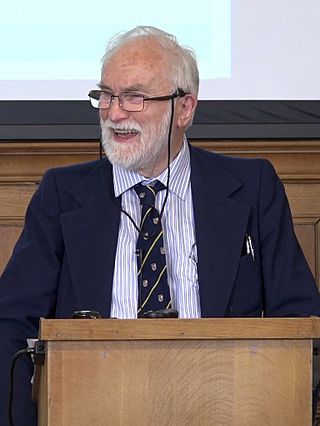
Andrew Finlay Walls was a British historian of missions, best known for his pioneering studies of the history of the African church and a pioneer in the academic field of World Christianity.
World Christianity or global Christianity has been defined both as a term that attempts to convey the global nature of the Christian religion and an academic field of study that encompasses analysis of the histories, practices, and discourses of Christianity as a world religion and its various forms as they are found on the six continents. However, the term often focuses on "non-Western Christianity" which "comprises instances of Christian faith in 'the global South', in Asia, Africa, and Latin America." It also includes Indigenous or diasporic forms of Christianity in the Caribbean, South America, Western Europe, and North America.

Kwame Bediako, also known as Manasseh Kwame Dakwa Bediako, was a Ghanaian Christian theologian and Rector for the Akrofi-Christaller Institute for Theology, Mission and Culture in Akropong, Ghana.

Johannes Zimmermann was a missionary, clergyman, translator, philologist and ethnolinguist of the Basel Evangelical Missionary Society of Switzerland, who translated the entire Bible into the Ga language of the Ga-Dangme people of southeastern Ghana and wrote a Ga dictionary and grammar book. Mostly an oral language before the mid-nineteenth century, the Ga language assumed a written form as a result of his literary work. Zimmerman's work built upon the single introductory grammatical treatise written by the Euro-African Moravian missionary and educator, Christian Jacob Protten, in the Ga and Fante languages, and published a century earlier in Copenhagen, in 1764.

Johann Gottlieb Christaller was a German missionary, clergyman, ethnolinguist, translator and philologist who served with the Basel Mission. He was devoted to the study of the Twi language in what was then the Gold Coast, now Ghana. He was instrumental, together with African colleagues, Akan linguists, David Asante, Theophilus Opoku, Jonathan Palmer Bekoe, and Paul Keteku in the translation of the Bible into the Akuapem dialect of Twi. Christaller was also the first editor of the Christian Messenger, the official news publication of the Basel Mission, serving from 1883 to 1895. He is recognised in some circles as the "founder of scientific linguistic research in West Africa".
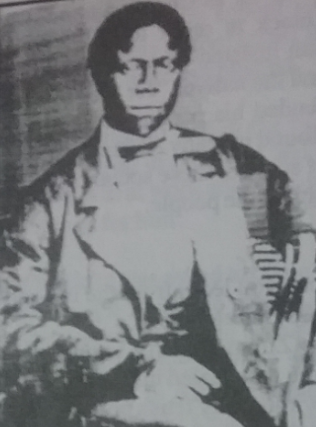
David Asante was a philologist, linguist, translator and the first Akan native missionary of the Basel Evangelical Missionary Society. He was the second African to be educated in Europe by the Basel Mission after the Americo-Liberian pastor, George Peter Thompson. Asante worked closely with the German missionary and philologist, Johann Gottlieb Christaller and fellow native linguists, Theophilus Opoku, Jonathan Palmer Bekoe, and Paul Staudt Keteku in the translation of the Bible into the Twi language.
The Biographical Dictionary of Chinese Christianity (BDCC) is a biographical dictionary which focuses on the lives of Chinese Christians and foreign Christian missionaries to China. It is published in both Chinese and English.
Reverse mission is a Christian missiological concept focusing on the late-20th-century reversal of early missionizing efforts, whereby Christians from Africa, Asia, and Latin America send missionaries to Europe and North America.
David B. Barrett was a British visiting professor at Columbia University, an Anglican priest, and research secretary for the Anglican Consultative Council.
Philomena Njeri Mwaura is a Kenyan theologian who is an Associate Professor of Philosophy and Religious Studies at Kenyatta University. She has written in the areas of African theology and mission.
References
- ↑ Sigg, Michèle Miller (October 2015). "The Dictionary of African Christian Biography and the Story of Ethiopian Christianity". International Bulletin of Mission Research. 39 (4): 204–207. doi:10.1177/239693931503900411. S2CID 163536603.
- ↑ "Stories". Dictionary of African Christian Biography. Retrieved 6 October 2020.
- ↑ Bonk, Jonathan (June 2006). "The Dictionary of African Christian Biography: What it is, How it Began and Where it is Going". Lausanne World Pulse. Retrieved 6 October 2020.
- ↑ Bonk, Jonathan J. (January 1999). "The Dictionary of African Christian Biography : A Proposal for Revising Ecclesiastical Maps". Missiology: An International Review. 27 (1): 71–83. doi:10.1177/009182969902700114. S2CID 162771230.
- ↑ "About". Dictionary of African Christian Biography. Retrieved 6 October 2020.